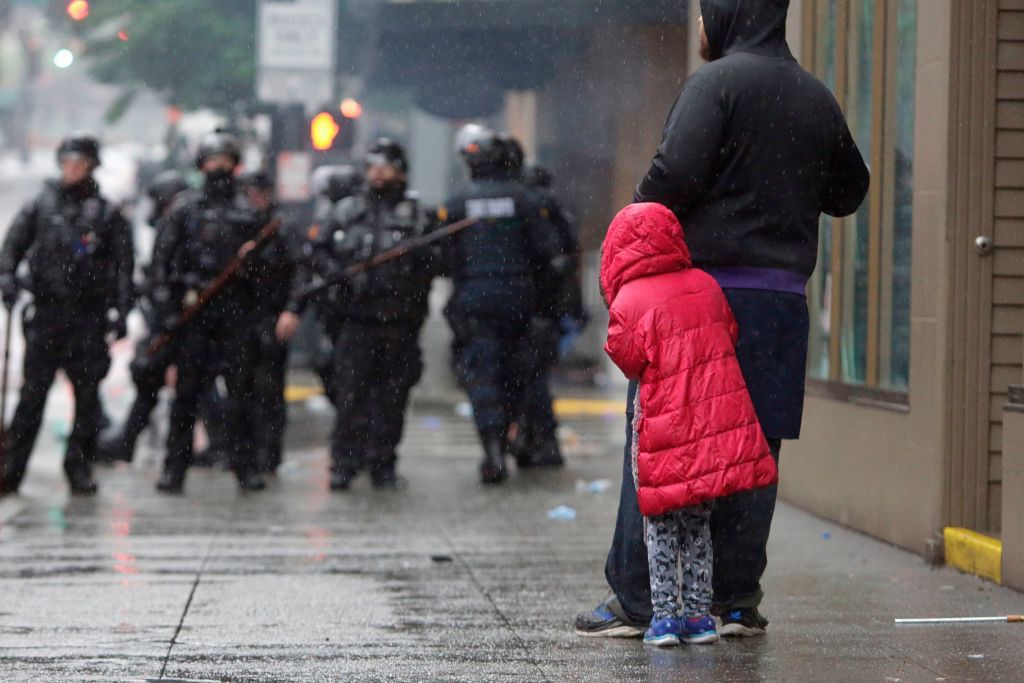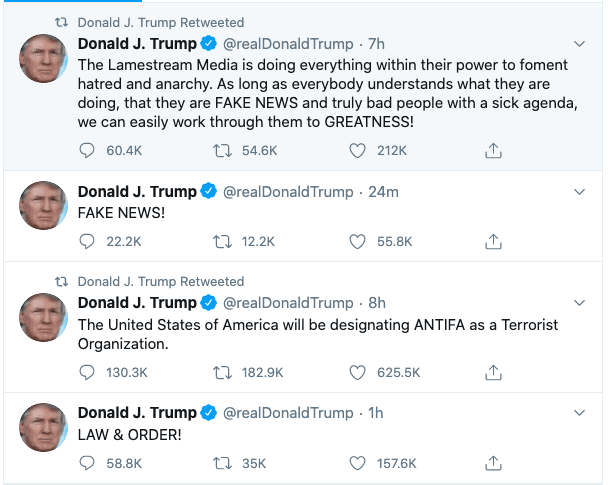A Failure Of Leadership

We are seeing our cities on fire in the worst civil unrest since the late 1960s, and here is what the President of the United States has had to say to the nation today:

That fool also tweeted out a QAnon conspiracy buff’s message today, but took it down. While the nation’s cities are burning, the President of the United States sat in the White House tweeting conspiracy theories.
And you know, we should probably count our blessings. If he went on TV to address the nation, Trump would probably make things worse. There he sits in the White House, impotent, an angry old man who doesn’t know what to do, and who, being utterly despised by half the country — but not feared! — cannot possibly gain control of the situation.
What a rotten time. In 1968, when Nixon ran on restoring law and order, there was at least good reason to believe that he was competent enough to address those challenges. Not Trump. A conservative can rightly conclude that Biden and the Democratic Party would do no good (think of Mayor Pajama Boy in Minneapolis, surrendering the Third Precinct), but whataboutism is cold comfort. The fact is, we have a massive national crisis underway, a crisis on top of two other crises — pandemic and economic collapse — and we are led by a buffoon who does nothing but sit on his backside and tweet. It’s infuriating!
But with the powerful exception of Atlanta Mayor Keisha Lane Bottoms — you have to watch her short address here — there have been few examples of strong leadership. The national media are perseverating on a narrative broadly sympathetic to the rioters. Today the Washington Post published a column by a woke masochist whose family-owned Indian restaurant in Minneapolis was burned to the ground by rioters, who says “let it burn” because racism. I guarantee you that 99 percent of all people, of all races, whose small businesses have been looted or burned by rioters do not feel this way. Democracy dies in darkness, you know; maybe the fires from torched businesses will shed the light we need.
Heather Mac Donald surveys the collapse in leadership:
On Friday, May 29, Minnesota governor Tim Walz explained his reluctance to mobilize the National Guard as an unwillingness to seem “oppressive.” Naturally, he apologized for his white privilege—“I will not patronize you as a white man without living [your] lived experiences”—and explained the feral violence as an understandable response to racial injustice: “The ashes are symbolic of decades and generations of pain, of anguish, unheard.” Few arrests were made after five days of rampant crime.
The media, visibly exhilarated by this latest explosion of black rage, had its own explanation for the chaos: people were outraged that the officer who had kept his knee on Floyd’s neck for a sickening eight-plus minutes had not yet been arrested and charged. But when that arrest came, along with murder and manslaughter charges after a lightning-fast investigation by the district attorney, the anarchy continued—not just in Minneapolis but across the country, intensified by Antifa radicals.
Political leaders elsewhere have been just as reluctant to use the necessary force to quell the violence. New York mayor Bill de Blasio called on police to use a “light touch” in response. New York governor Andrew Cuomo coolly predicted on Sunday, May 31, during his now absurdly irrelevant daily coronavirus press conference, that the violence would continue. “The explosion we saw last night we’ll probably see again tonight,” he said—obviously confident in his own physical safety, if not the safety of the rest of the state’s residents.
More:
Fittingly, the ideological handmaiden of this violence—academia—has already sprung into action. The chancellors and presidents of Harvard, the University of Arizona, the University of Pennsylvania, and Yale, among others, released statements over the weekend assuring their black students of their schools’ commitment to racial equity, in light of the George Floyd death—an event wholly unrelated to the academic. No college leader denounced the violence.
UCLA’s chancellor Gene Block, as well as the school’s $400,000 a year Vice Chancellor for Equity, Diversity, and Inclusion and a parade of deans, announced that the Office of Equity, Diversity, and Inclusion and the school’s legions of Equity Advisors would be coming up with new programs for “virtual reflection spaces” in which to “humbly acknowledge the pain.” The school’s Resources for Racial Trauma would be beefed up. The academic diversity bureaucracy has now been given a whole new excuse for existence and can be assured that it will escape the cost-cutting chopping block, even as universities beg the federal government for more coronavirus bailout money.
I expect corporate, academic, and media leadership to be as weak and unprincipled as Evergreen State’s George Bridges, who let himself be stomped to a puddle by woke mobs. But we have a Republican president in the White House who is as useless in this crisis as teats on a boar. It is not the case that the fecklessness of liberal leaders, both political and institutional, somehow improves Trump. It doesn’t. Ann Coulter, who in 2016 wrote a book called In Trump We Trust, has had it:

If you are a conservative, where do you see hope right now? Serious question. I’m not talking about hope in the broad, reason-to-live sense; I’m talking about where you find hope that our leadership class, political and otherwise, are capable of dealing with this crisis.
UPDATE: As Ross Douthat wrote a couple of weeks ago:
But Trump didn’t want the gift [of presidential authority]. It’s not just that our president was too ineffective to consolidate power, that any potential authoritarianism was undermined by his administration’s incompetence. Incompetent he surely is, but in areas that involve his self-preservation (like the firing of inconvenient inspectors general) he still finds a way to wield his powers even when norms stand in his way.
But once you leave the sphere of petty corruption for the sphere of policymaking, Trump clearly lacks both the facility and the interest level required to find opportunity in crisis. In this case, confronted with the same basic facts as Orban, he showed no sense of the pandemic as anything save an inconvenience to be ignored, a problem to be wished away, an impediment to his lifestyle of golf and tweets and occasional stream-of-consciousness stemwinders. And when reality made ignoring it impossible, his only genuinely political impulse — the only impulse that related to real power and its uses — was to push the crucial forms of responsibility down a level, to the nation’s governors, and wash his presidential hands.
In this the coronavirus has clarified, once and for all, the distinctiveness of Trump’s demagogy. Great men and bad men alike seek attention as a means of getting power, but our president is interested in power only as a means of getting attention. Which is why, tellingly, his most important virus-related power grab to date has been the airtime grab of his daily news conferences — a temporary coup against the cable television schedule, a ruthless imposition (at least until the reviews turned bad) of presidential reality TV.